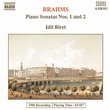| All Artists: Johannes Brahms, Idil Biret Title: Brahms: Piano Sonata No. 3; Ballades, Op. 10 Members Wishing: 0 Total Copies: 0 Label: Naxos Original Release Date: 1/1/1992 Re-Release Date: 2/15/1994 Genre: Classical Styles: Forms & Genres, Ballads, Sonatas, Historical Periods, Romantic (c.1820-1910) Number of Discs: 1 SwapaCD Credits: 1 UPC: 730099535229 |
Search - Johannes Brahms, Idil Biret :: Brahms: Piano Sonata No. 3; Ballades, Op. 10
 | Johannes Brahms, Idil Biret Brahms: Piano Sonata No. 3; Ballades, Op. 10 Genre: Classical
|
Larger Image |
CD DetailsSimilar CDs |
CD ReviewsAmazing piano compositions and a full-blooded pianist Hexameron | 01/13/2007 (5 out of 5 stars) "I've just recently heard Brahms's Op. 1 and 2 piano sonatas for the first time, performed by Idil Biret on the Naxos label. While I think the Op. 1 and 2 are remarkable for having been conceived by a 20 year old Brahms, they were still light and admittedly average. I find myself completely shocked, however, at the progression found in this third sonata. In addition to this sonata, the Ballades are also powerful and exquisite gems that deserve as much praise as the Op. 5. For those already familiar with the works, I'm afraid I won't be of much help in comparing Biret to Perahia or Kissin or anyone else. My familiarity with these pieces stems only from Biret's recording here. Nevertheless, she plays these works with astounding endurance, intensity and passion. I don't know if her interpretation is the most refined or if her phrasing is immaculate. But she plays with fire and energy that surely enhances the inherent drama in these works. In the lyrical sections, she is warm, gentle, melancholy and very patient to express all that Brahms has to say.
The Piano Sonata No. 3 is mindboggling. The music material and the caliber of the themes is much improved from the last two sonatas. I don't know what happened in between Op. 2 and Op. 5, but Brahms has written his greatest piano sonata here. It's a shame he didn't return to the form later in his life since at the tender age of 20 he has managed to compose such a good one. The first movement sounds more like Liszt with its virtuosic flare; of course the dark but majestic main theme is pure Brahms. Biret really creates a hellfire of torrential piano chords during the course of this movement. She contrasts this in the gentle moments where her delicacy is quite apparent. The second movement is another stunning piece. Where did Brahms find these ideas? His melancholy and passion is absolutely sublime in this movement; the gradual release of romantic feelings at the end is of such gorgeous proportions. It also seems reminiscent of Liszt. Biret really taps into her reflective side and actually gives vocal powers to the piano strings. The last three movements of this sonata are original and melodically unique. The Scherzo contains a delightful waltz-like theme and a contemplative trio section. Biret plays both sections with outstanding dynamics and control. The Intermezzo is a splendid and poignant work that explores a dark mood, very similar to Beethoven's Funeral March movement from his Piano Sonata No. 12. Some of the most quiet and brooding music occurs in the middle and Biret showcases her tremendous mastery of dynamics. She bids pianissimo and then commands forte in a single bar. The finale is an exciting epilogue to this grand sonata, played with energy and enthusiasm. Biret's fusion of technique and singing tone is especially emphasized here. The music itself is wonderful all throughout. Under Biret's fingers, the virtuosic sections scintillate in the style of Alkan and Chopin. Although I have no other recording to use as a measure, I believe Biret does a magnificent job with the Ballades. She delivers drama and raw emotion. And there is nothing missing or weak in her execution. The first Ballade is mindblowing in its originality and its overwhelming sinister nature. Again, I am reminded of Liszt with the menacing bass chords and funeral atmosphere. Biret plays this piece with full-blooded passion, creating a cloud of angst throughout the work. The second Ballade explores lighter and more romantic material; Biret exhibits her graceful touch and ability to summon a serene wall of sound from the piano. The third Ballade is my least favorite but still attractive with its ternary form in the style of an Intermezzo. The fourth Ballade, though, is my personal favorite. Brahms unearths a ghostly mist of haunting music. Biret understands this music and she plays with all the appropriate depth and feeling. Bottom line: For piano masterpieces of Brahms's youth, this CD is a must-have. Biret's virtuosity and nuanced playing makes these works incredibly engrossing. The music breathes, the drama is bursting, the melodies are clear, and the budget price of this disc makes it highly recommendable." |

 Track Listings (9) - Disc #1
Track Listings (9) - Disc #1

